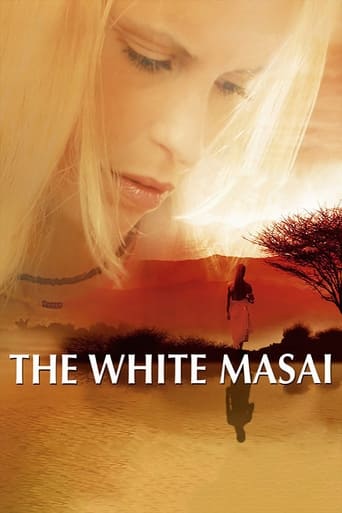Roedy Green
I had low expectations for this picture, and boy was I surprised. This is really gripping picture. Every frame riveted my interest. It is about two people from two extremely different cultures trying to make a go of it. Both do their best. Both confound each other by failing to explain their cultural expectations.You would think this fish out of water plot would generate a comedy with lots of African music. But it doesn't. You feel the anger and frustration of both parties over their anger at their partner refusing to behave "sensibly".I don't think I have ever seen a film that even attempted to give me an idea of what is is like to be an African living in a hut. It was quite gut wrenching.In one sense she failed, but her life was ever so much richer because she dared to follow her heart. Be prepared; the film is 131 minutes.
bebop63-1
Having just finished reading The White Masai in paperback, I waited in anticipation of getting the DVD from the local library, albeit with some trepidations, knowing that film adaptations of books don't always follow true to the written work. That is certainly the case with this one. Firstly, why the change of names of the characters in the book - from Corinne to Carola, Lketinga to Lemalian, Napirai to Sarai, etc? Everyone who has read the book will know the characters anyway no matter what their names are. Also, there seem to be some vital points in the book that were not depicted in the movie. The novel extensively describes how Corinne's physical health was greatly affected from having to live in near-primitive conditions with nil in basic amenities like proper drinking water and sanitation, tropical diseases and inadequate diet. Doesn't it seem incongruous that in the movie this doesn't seem to be the case with Carola - she emerges from the hut cum loveshack each day fresh as a newly-budded rose, skin aglowing & hair shining like gold in the morning sun? She merely appears to be in a reality TV tour group rather than having assimilated herself into the tribe. It would certainly have helped to have a Westernized educated Samburu character to help bridge the (communication) gap between Carola and Lemalian, which in the book would have been James (Lketinga's brother). That said, the bottom line that both book and film raise is: can two people of contrastingly different cultures live together in harmony and genuine affection? How much is one prepared to sacrifice in the name of love? The film is aware of all these questions but does not give a definite answer - it all remains up to the viewer to put himself/herself in the heroine's shoes and ask "would I have done the same as Carola? Would I give up all the creature comforts of life that I've known and been accustomed to and live in woop-woop with a man I hardly know from a totally alien background?" While the movie does portray non-whites in a more positive light than other movies with a similar theme, it continues the long history of inequivocal relations between whites and blacks in general and it concludes that the Africans have been and always will be culturally inferior to whites. Even though the film is sympathetic to the Samburu people and evidently shows how naive and clueless as far as cultural sensitivities go with Carola, it's telling her side of the story. It would be very interesting indeed if the movie would be (re)made from Lemalian's point of view, but alas that is just a pipe dream.
shirley-112
Although the film takes liberties - the book makes it clear the warrior speaks neither English or German -- the question must be asked: why does a woman fall in love with a man she doesn't even know. It couldn't have been lust because it was clear he was an appalling lover initially at least. The cultures are so far apart. This is not just Africa vs Europe but rural Africa vs urban Europe. The film in no way explains how a person, probably educated and surely emancipated, would want to spend her live in the bush with a macho man with nothing but outstanding scenery to compensate. Living in a shared hut and sharing pools of water to wash. No wildlife, just goats and cattle; seemingly nothing to read, no one with whom to communicate except the odd visit to another woman in the town and a hostile pastor. It is so far from comprehensible that I viewed the film with increasing incredulity. Yes, the scenery was wonderful but African is so much more.
marjorie-25
As a (white) woman who was once involved with an African man, I'm always a bit skeptical of these "Jungle Fever"-like movies. I was very pleased to discover there isn't a huge emphasis on titillation. The director could've easily made it more salacious. Interracial couples are more than just their contrasting skin colours or fodder for the sexual fantasies of others.I wasn't surprised by this woman's difficulties in the small, remote, Kenyan village. One could predict she'd face all those obstacles, and more.I was surprised by how many of the reviews suggest her problems were her "fault" or that there is ANY "reason" for the husband's actions. No matter what the nationality of my various, past boyfriends and current husband, none of them would ever conduct themselves like that towards me (and live to tell about it) (wink), nor would they desire to do so. My African boyfriend was a model of civility and respect for women. Indeed, every man I've been involved with has been the embodiment of the term "integrity". Men who behave in insulting, unjust, much less violent, ways towards women (or anyone, really) aren't worthy of my consideration.It's not that I don't "get" why the dynamics between the two lead characters causes some conflict within the framework of the society in which they live. It's just that, at some point, some things are just right or wrong. Making false accusations, especially against someone you profess to love, is unconscionable. There is no excuse for his behaviour. Comparing his outrageous behaviour to her naiveté is ludicrous! This man, like soooooooooooo many around the world (it seems), is so infantile and weak, he feels he must brutalize a woman to make himself feel better. ...Pathetic.Still, I generally liked Lemalian (Jacky Ido), until he fell from grace. I was surprised by Carola's decision not to adopt more of the local customs, as well as her ultimate decision, at which point the movie ends. I could still see ways the two could work beyond their cultural differences, especially since both had so generously tried to understand the other's point of view.In all honesty, I found the couple's attire differences to be jarring, especially in more urban settings. I fully expected one or the other to start dressing more alike. With the very traditional Masai garb juxtaposed against modern women's clothing, I surprised myself with how much I noticed this contrast, throughout the film.In all, I enjoyed this movie most because it is alleged to be a true story. I think it wouldn't be either as believable or engaging, if it were fictitious. I would recommend it as a video rental for an easy-going Sunday afternoon.


